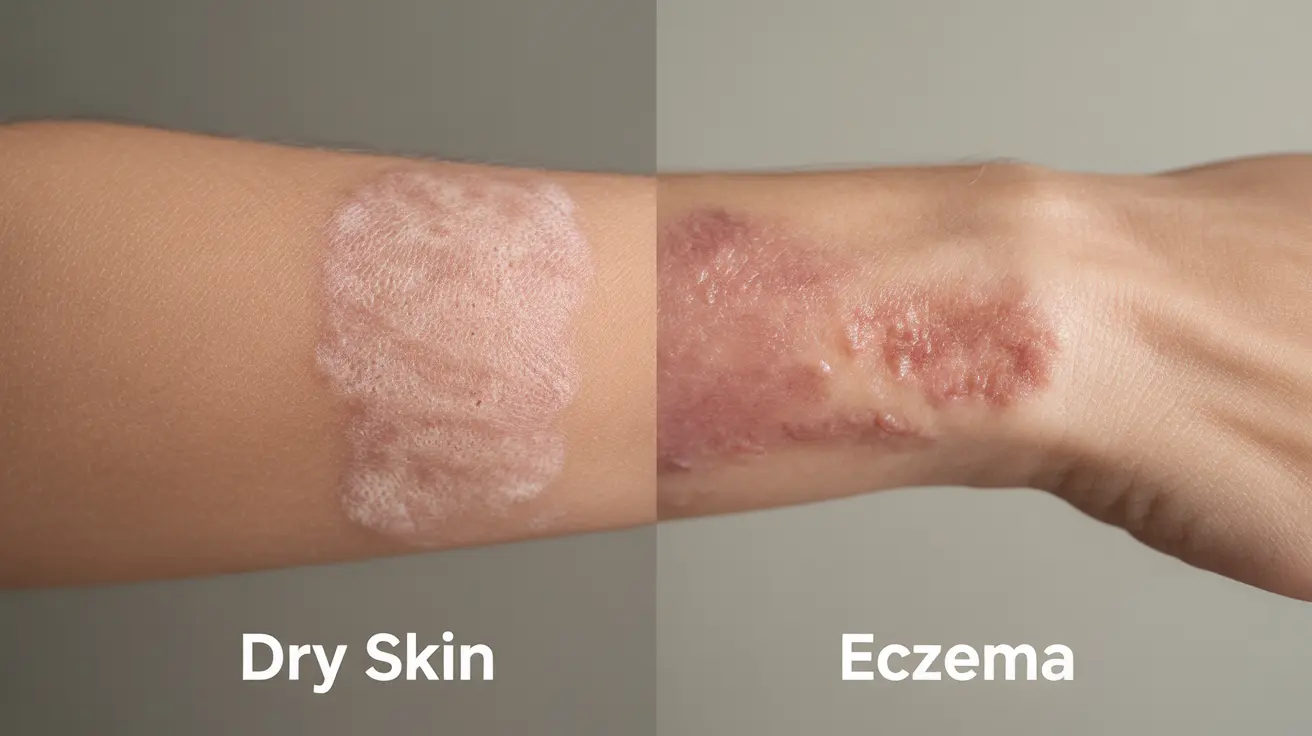Distinguishing between eczema and dry skin can be challenging, as these conditions share some similar characteristics. However, understanding their unique features is crucial for proper treatment and management. While both conditions can cause discomfort and affect your skin's appearance, they have distinct causes, symptoms, and treatment requirements.
This comprehensive guide will help you identify whether you're dealing with common dry skin or eczema, and provide expert insights into managing both conditions effectively.
Understanding the Fundamental Differences
While dry skin and eczema may appear similar at first glance, they have several distinguishing characteristics that set them apart.
Characteristics of Dry Skin
Dry skin, or xerosis, is a common condition that occurs when your skin lacks sufficient moisture. It typically presents with:
- Rough, flaky texture
- Mild itching
- Temporary redness
- Seasonal or environmental triggers
- Even distribution across affected areas
Characteristics of Eczema
Eczema, also known as atopic dermatitis, is a chronic inflammatory skin condition characterized by:
- Intense itching
- Red, inflamed patches
- Thickened or leathery skin texture
- Specific pattern distribution
- Possible oozing or crusting
- Clear boundaries between affected and unaffected skin
The Connection Between Dry Skin and Eczema
While dry skin and eczema are distinct conditions, they can be interrelated. Dry skin can make you more susceptible to eczema flare-ups, and both conditions can benefit from proper moisturizing routines.
Professional Diagnosis and Assessment
Healthcare providers use specific criteria and examination techniques to differentiate between dry skin and eczema:
- Visual examination of affected areas
- Review of medical history
- Assessment of symptom patterns
- Evaluation of triggers and environmental factors
- Possible patch testing for eczema diagnosis
Treatment Strategies and Management
Managing Dry Skin
Dry skin typically responds well to simple interventions:
- Regular application of moisturizers
- Gentle, fragrance-free cleansers
- Humidity control in living spaces
- Adequate hydration
- Protection from harsh weather conditions
Treating Eczema
Eczema requires a more comprehensive treatment approach:
- Prescription topical medications
- Moisturizers designed for sensitive skin
- Trigger avoidance
- Possible systemic medications
- Stress management techniques
- Regular dermatologist consultations
Prevention and Lifestyle Modifications
Both conditions benefit from preventive measures and lifestyle adjustments:
- Using mild, hypoallergenic products
- Avoiding hot water during bathing
- Wearing breathable fabrics
- Maintaining optimal indoor humidity
- Regular skin care routine
- Stress reduction techniques
Frequently Asked Questions
What are the main differences between eczema and dry skin symptoms?
Eczema typically presents with intense itching, inflammation, and distinct patches with clear boundaries, while dry skin shows general roughness, mild itching, and more uniform dryness across affected areas. Eczema can also feature oozing or crusting, which isn't present in typical dry skin.
Can dry skin cause eczema or trigger eczema flare-ups?
While dry skin doesn't directly cause eczema, it can trigger flare-ups in people who already have the condition. Maintaining well-moisturized skin is crucial for preventing both dry skin and eczema symptoms.
How is eczema diagnosed differently from dry skin by a doctor?
Doctors diagnose eczema through careful examination of skin patterns, medical history review, and sometimes patch testing. Dry skin is typically diagnosed through visual examination and discussion of environmental factors and skincare habits.
What are the most effective treatments for managing eczema versus dry skin?
Dry skin usually improves with regular moisturizing and gentle skincare, while eczema often requires prescription medications, including topical corticosteroids or immunomodulators, along with specific skincare routines and trigger avoidance.
How can I prevent eczema flare-ups if I have naturally dry skin?
Prevent flare-ups by maintaining a consistent skincare routine, using appropriate moisturizers, avoiding known triggers, managing stress, and keeping your environment at optimal humidity levels. Regular consultation with a healthcare provider can help develop an effective prevention strategy.




